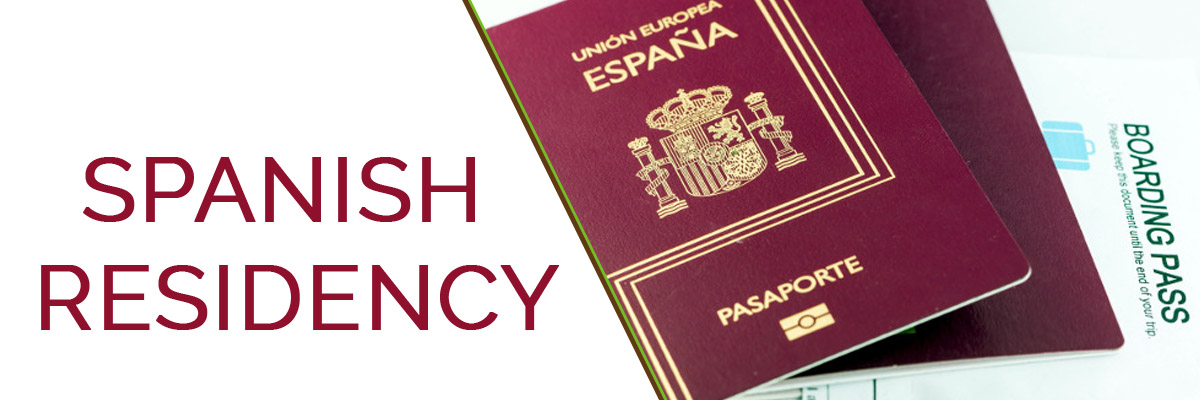Marbella Legal Advice Blog for Families on the Costa del Sol |
 |

The Marbella Legal Advice Blog for Families is a collection of the top concerns we've received on our site related to legal issues for expats living in Spain or considering purchasing a property or business on the Costa del Sol.
The content of the Marbella Legal Advice Blog been authored by Francisco Sánchez Jimenez, a professional lawyer in Marbella who has also lived here his entire life. His law firm, Sánchez & Beck Abogados, has extensive experience working with international families who have chosen to establish a lifestyle or business on the Costa del Sol.
If you have a specific question that you'd like to see addressed on the Marbella Legal Advice Blog, please let us know about it using our Ask a Question feature located on the bar above. Or, leave your question on our Facebook Comments section, below. We'd be glad to address topics you personally would be interested to read more about.
Real Estate Investment | Spanish Residency | Tax Declaration | Making a Will
Real Estate Investment in Spain: General Terms & Taxation

In general terms,
there are several ways of investing in real estate: you might be interested in
buying a property directly from a developer, from a previous buyer or buy a
plot of land and build your own house.
We will focus this article in the last one of the cases, i.e. the purchase of a plot of land and the construction of a house, although we will give some general ideas of the taxation in the rest of the cases as well.
1. Acquisition of a house/building from the promoter (first transfer of the Real Estate): this occurs either when the developer makes the first transfer once the construction is finished or when the transfer is made when the developer has been using the property itself for less than 2 years.
This transfer is subject to the payment of VAT (10% of the price) and a Duty Stamp (1.5% of the price or 0.3% if the price is less than €130.000, and the acquirer is younger than 35 years of age and the property will become the main residence).
2. Second transfer of houses/buildings: this would happens when there is a prior transfer of the property or when the promoter has been using the property for more than two years before the purchase.
In this case, there is no VAT involved (except when both seller and purchaser are VAT payers)
This kind of transfer is subject to Transfer Tax. This tax, as well as the Duty Stamp, depends on the autonomous community. In the Region of Andalucía, the percentage to be applied to the purchase price is 8% (from €0 to €400.000), 9% (from €400.000 to €700.000) and 10% (from €700). No duty stamp is involved when purchase is subject to Transfer Tax.
Nevertheless, there are some exceptions to the percentages above mentioned: transfer tax would be just 2% if the house is bought as an investment property and it resells in less than 5 years after the purchase (some other requirements to be fulfilled); if the price is less than €130.000, the buyer is younger than 35 years of age and the property will become the main residence, transfer tax would be 3.5% of the purchase price.
Reduced VAT of 10% is also applicable to the refurbishment of an old house if such property will be considered as a first domicile (all of it or more than 50% of the construction), if the restoration does not take longer than 2 years and if the constructor does not provide the materials (or provide less than 40% of the budget). If those requirements are not fulfilled, VAT would be the standard 21%.
3.Buying an urban plot of land and building a house: declaration of the new construction:
This declaration seeks to synchronize the plot information with the information in the land registry. Tax on the purchase of an empty plot of land would be the same as the transfer tax on the purchase of a house that we just referred to previously. As well as in previous case, no Duty Stamp is involved.
In case VAT would be involved (the buyer and the seller will be VAT payers) the tax would be 21% and not 10%. In this case, it would also be subject to the payment of a 1.5% of duty stamp.
The declaration of the new construction is subject to the payment of another 1.5% of Duty Stamp of the construction value. The construction is also subjected to the payment of the construction licence to be granted by the town hall.
The declaration of a new construction is to be bestowed through a notarized title deed and can either be done once the building is completed (most of the cases) or before (normally when the owner needs to be financed). In case you would want to declare an old construction, the payment of the tax might be expired (4 years for constructions finished prior to May 2000, 10 years for buildings finished after that date).
Formalities to grant the declaration of a new construction are as follow: construction licence, certification of the architect in charge of the construction certifying that the building has been finished following the project in which the licence was granted, decennial insurance, licence of first occupation, energy certification and construction’s book (with details of the building, parties involved in the works, maintenance instructions, guarantees, etc.)
Declaration of New Construction
- Construction licence
- Certification the architect of finalisation according to the licence
- Decennial Insurance
- First occupation
licence
- Construction book
Declaration of Old Construction
- Certification of the architect with construction age and description of the building
- Cadastre certification
MarbellaFamilyFun.com recommends you seek Marbella legal advice prior to purchasing property of any kind. For specific questions regarding this topic, contact Sanchez + Beck Abogados for details.
Obtaining Spanish Residency Through a Direct Investment

On September 29th 2013, came into effect Law 14/2013 “for the support of support of entrepreneurs and their internationalization”.
This law enables foreigners to obtain a residency permit
through investments in Spanish real estate and/or other government backed
financial products and private investment schemes in Spanish companies. The aim
of the law is to stimulate foreign investment by attracting internationals to
Spanish capital markets, real estate and public debt,
By application of this law, foreign citizens obtain (what is now referred to as) a “Golden Visa”. The successful application of which is enforced by means of various channels: an investment in Spanish Government Bonds of at least €2 Million; an investment of more than €1 Million in shares of Spanish companies, bonds and participation in Spanish companies; or in deposits in Spanish Bank entities; or through the acquisition of real estate properties for a total value of at least €500,000 (free of any burden or debt).
The applicants must fulfil the following requirements (to be presented at the nearest Spanish consulate to the proximity of their domicile):
i. Not to have entered or stayed illegally in Spanish territory.
ii. To be at least 18 years old.
iii. To have not been refused entry to any of the Schengen countries.
iv. Have public or private health insurance authorized to operate in Spain.
v. In case of participations in companies: a Notary public certificate stating the amount of the investment.
vi. In case of investments in shares or bonds: a certificate from a recognized financial institution stating the investment amount.
vii. In case of a real estate investment: Proof of the investment must be certified through a Registry of Property certificate attesting to ownership. Or indeed with a copy of the acquisition of public deed and proof of filing the deed in the Registry, if the ownership title is not yet registered.
Despite the fact that this is a non-exhaustive list of methods by which one can obtain said visa (alternatives being working permits, non-lucrative permits, and such), the aforementioned certainly serves as the ideal opportunity with which to do so. Furthermore, the list serves as by far the fastest, surest and least bureaucratic method of obtaining a Spanish residency permit and renewing it.
Another advantage of this process is that it may be issued not only to the investor but also to their immediate family, (including spouse and children up to 18 years of age – a stipulation introduced as those younger than 18 are considered not objectively capable of looking after themselves).
Contrary to other forms of permits, there is no requirement for a minimum stay in order to renew residency – meaning it is entirely optional whether or not to reside in Spain, as there is no law requiring a minimum stay, and no necessity in becoming a tax resident. In any case, the applicant must be able to prove that the person in question has travelled to Spain at least once in the first two years, and once more in the three subsequent years after obtaining the residency permit.
Another advantage of obtaining a Spanish residency permit is the ability to travel freely in the European Schengen area for 90 out of every 180 days.
Investing in Spain presents a very interesting proposition for foreigners at this time. This is not merely attributed to the detailed advantages of being a Spanish resident, but with the economic dynamics that currently govern the Spanish real estate investment market, offer a lucrative opportunity for subscribers to the scheme. Not to mention the classic reasons to enjoy Spain: weather, gastronomy and culture among many other wonderful amenities the country has to offer.
MarbellaFamilyFun.com recommends you seek Marbella Legal advice prior to applying for the residency option, above. For specific questions regarding this topic, contact Sanchez + Beck Abogados for details.
Caution When Buying Property Below its Declared Tax Value...

When
you decide to purchase a property in Spain you should choose a reputable agency
that helps you find the right property and most importantly you should also
choose an experienced lawyer that helps you to make sure that all transactions
go as smooth as possible.
One possible pitfall are the taxes that you have to pay.
Starting on the basis that in a free market society the price of a sale is the one agreed between seller and buyer, taxes that have to be paid by both of them do not always depend on that but on the value granted by the government. Even if once the transaction is made, the taxpayer will declare and pay the taxes calculated on the purchase price; it is more than foreseeable that the administration will issue a Tax settlement calculated on the “minimum tax value”. This will obviously affect the tax base and therefore the tax itself. The taxpayer will be enforced to pay the difference between the amount paid and the result of the settlement plus the interest on that difference.
Even graver would be to buy under the property tax value since in that case, along with the tax settlement and the interest, the administration will impose a penalty based on the difference between the purchase price and the property tax value.
This matter does not affect only the buyer (subjected to the payment that comes along with a purchase, inheritance or any other way of acquiring a property: transfer tax, duty stamp, donation or inheritance tax) but also to the seller (subjected to the payment of the capital gain tax).
Therefore we recommend to consult a lawyer before the purchase. He can assure you together with your agency that your dream home will not cause you sleepless nights.
It is very important to check, prior to the purchase, what is the minimum tax value established by the government. To face a higher value should not prevent you from buying (quite the opposite! It actually means that the estate agent has found a good deal with a price below the value), but at least the taxpayer should be aware of the consequences so as this extra cost can be budgeted for.
Nevertheless, these kinds of settlements are not always undisputable. There is a wide jurisprudence that pronounces the right of the taxpayer to discuss the value, not to mention other ways of appealing such as the prescription, lack of formalities in the notifications, etc.
As we mentioned, the tax value given to the property by the government can be challenged. The government establishes a general value depending on the area where the house is located (i.e in Marbella, the minimum value would be the result of multiplying the cadastral value for 1,31). But that does not mean that that is the real value: The condition of the building, the market value, and other matters can be taken into consideration in order to fix a final value (a 10% reduction on the value is accepted by the government). This has to be done through what it is called a qualified contradictory appraisal to be drafted by an architect.
In Sanchez & Beck Abogados we have a great deal of experience in challenging these kinds of tax settlements. We have in the past achieved cancellations of the settlement or deductions on more than 70% on the tax.
Despite the fact that in our opinion it is something that must be foreseen prior to the purchase, if you find yourself in this situation, do not hesitate to contact Sánchez & Beck Abogados. We will study in depth your case and put all the effort into saving you money.
MarbellaFamilyFun.com recommends you seek Marbella Legal advice prior to submitting tax returns in Spain. For specific questions regarding this topic, contact Sanchez + Beck Abogados for details.
Reasons for Making a Will when Buying a Property in Spain

I normally recommend my foreign clients to secure a notarized will when buying real estate in Spain in order to leave the property they own to whom they want to inherit such property. It is a simple and economic formality that makes things easier should any of the buyers pass away.
The absence of a testament signed in Spain would not prevent the succession from taking place, as it could still be done through a will granted in the client’s own country or by means of a judicial procedure of adjudication of the estate. Nevertheless all these documents must be legally translated into Spanish and must be accompanied by the Apostille of The Hague (or the proper certification of the country in case such country is no signatory to the Convention of The Hague).
These particularities make all the formalities more expensive and complex in terms of length of time. In this sense, we must consider that the Inheritance tax for a non-resident must be arranged in Madrid with the Oficina Nacional de Gestión Tributaria (under the authority of the Agencia Tributaria Estatal) and not at the Oficina liquidadora of the city where the property is located (although, after a recent Sentence passed by the European Court of Justice and the Law 26/2914, exemptions or discounts of the Autonomous Community where the goods are located, can be applied).
In order to grant the testament, we have to take into account that, under Spanish law, the law to be applied is the personal law of the testator (despite the rules of renvoi to the Spanish law that the country of the testator could establish). According to this, any will made other than in accordance with the personal law of the testator could indeed be challenged. In the UK, because of testamentary freedom, a testator may distribute freely and absolutely of all his property and rights, present and future ones. Hence, under English law, there are not compulsory inheritors nor persons in which favour the law has reserved certain inheritance rights. It does not happen the same way in other countries (e.g. France or Scandinavia) where the law establishes a legitimate share of the estate, similar to the one prescribed by Spanish Law.
The will can be executed before the notary at the same time of the purchase. In the testament deeds, besides the distribution of the estate and the identification of the testators, there are several details to be included, such as specifying whether any of the testators has been married before, whether their parents are alive or whether they have children arising from the present marriage or from a previous one.
MarbellaFamilyFun.com recommends you seek Marbella Legal advice prior to establishing a will in Spain. For specific questions regarding this topic, contact Sanchez + Beck Abogados for details.

About the Author: Francisco Sánchez Jimenez, Sanchez & Beck Abogados
The team at Sánchez & Beck Abogados have a great deal of experience in dealing with challenging legal and taxation issues faced by expat families on the Costa del Sol. Contact them directly regarding any specific questions at: sanchez@abogadosmarbella.net
Related links to Marbella Legal Advice Blog
We are delighted to share the content of the Marbella Legal Blog with you. Below you will find links related to the topics addressed in the Marbella Legal Advice Blog.
If you have a specific question that you'd like to see addressed on this blog, please let us know about it using our Ask a Question feature located on the bar above. Or, leave your question on our Facebook Comments section, below.
- Marbella Hospitals
- Marbella Rugby Club
- Best Schools in Marbella
- Marbella Legal, Financial & Insurance
- Real Estate for Families on the Costa del Sol